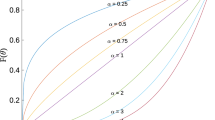Abstract
We propose to supplement the democratic election mechanism by threshold contracts. A threshold contract stipulates a performance level that a politician must reach in order to obtain the right to stand for reelection. “Read my lips” turns into “read my contract”. Politicians can offer threshold contracts during their campaigns. Equilibrium threshold contracts are welfare improving and do not violate the liberal principle of free and anonymous elections in democracies.
Similar content being viewed by others
References
Akemann M, Kanczuk F (1999) Term limits and term lengths. Working Paper, University of Sao Paulo
Banks J and Sundaram R (1998). Optimal retention in agency problems. J Econ Theory 82: 293–323
Barro R (1973). The control of politicians: an economic model. Public Choice 14: 19–42
Buchanan J, Tullock G (1965) The calculus of consent: Logical foundations of constitutional democracy. University of Michigan Press
Carey J, Niemi R, Powell L (2000) Term limits in state legislatures. University of Michigan Press
Dick A and Lott J (1993). Reconciling voters’ behavior and legislative term limits. J Public Econ 50: 1–14
Dixit A (1995). The making of economic policy: a transaction costs politics perspective. MIT Press, Cambridge
Drazen A (2000). Political economy in macroeconomics. Princeton University Press, Princeton
Ferejohn J (1986). Incumbent performance and electoral control. Public Choice 50: 5–25
Gersbach H (2002). Incentive contracts and elections for politicians and the down-up problem. In: Sertel, M and Koray, S (eds) Advances in Economic Design, Springer, Berlin
Gersbach H (2005). Designing democracy: ideas for better rules. Springer, Heidelberg
Gersbach H (2007) Vote-share contracts and democracy, CEPR Discussion Paper No. 6497
Gersbach H, Liessem V (2003) Incentive contracts and elections for politicians with multi-task problems. CEPR Discussion Paper No. 4075
Gersbach H, Mueller M (2006) Elections, contracts and markets. CEPR Discussion Paper No. 5717
Jensen H (1997). Credibility of optimal monetary delegation. Am Econ Rev 87: 911–920
Liessem V (2007) Electoral competition, incentive contracts for politicians and unknown preferences, Social Choice and Welfare (forthcoming)
Lockwood B (1997) State-contingent inflation contracts and unemployment persistence. J Money Credit Banking 29
Lupia A and McCubbins D (1998). The democratic dilemma. Cambridge University Press, Cambridge
Mueller D (1989). Public Choice II. Oxford University Press, Cambridge and New York
Persson T, Roland G and Tabellini G (1997). Separation of powers and political accountability. Q J Econ 112: 1136–1202
Persson T and Tabellini G (1990). Macroeconomic policy, credibility and politics. Harwood Academic Press, London
Persson T and Tabellini G (1993). Designing institutions for monetary stability. Carnegie-Rochester Conf Series Public Policy 39: 53–84
Persson T and Tabellini G (2000). Political economics: explaining economic policy. MIT Press, Cambridge
Petracca M (1992). Rotation in office: the history of an Idea. In: Benjamin, G and Malbin, M (eds) Limiting legislative terms, pp 19–51. CQ Press, Washington
Stiglitz JEA (1989). The economic role of the state. Blackwell, Oxford
Svensson L (1997). Optimal inflation targets, Conservative central banks and linear inflation contracts. Am Econ Rev 87: 98–114
Walsh C (1995a). Optimal contracts for central bankers. Am Econ Rev 81: 150–167
Walsh C (1995b) Price stability as the objective of monetary policy and recent central bank reforms. In: Bernanke B, Rotemberg J (eds) NBER Macroeconomics Annual 1995
Author information
Authors and Affiliations
Corresponding author
Additional information
We would like to thank Johannes Becker, Peter Bernholz, Robert Dur, Joao E. Gata, Volker Hahn, Susanne Lohmann, Christian Schultz, Otto H. Swank, Heinrich Ursprung, conference participants at the annual meeting of the Public Choice Society 2000, the European meeting of the Econometric Society 2001 and the annual congress of the European Economic Association 2001 in Lausanne, seminar participants in Heidelberg and Mannheim and the referee for valuable suggestions and comments. Financial support from the Deutsche Forschungsgemeinschaft (DFG) is gratefully acknowledged.
Rights and permissions
About this article
Cite this article
Gersbach, H., Liessem, V. Reelection threshold contracts in politics. Soc Choice Welfare 31, 233–255 (2008). https://doi.org/10.1007/s00355-007-0277-5
Received:
Accepted:
Published:
Issue Date:
DOI: https://doi.org/10.1007/s00355-007-0277-5



